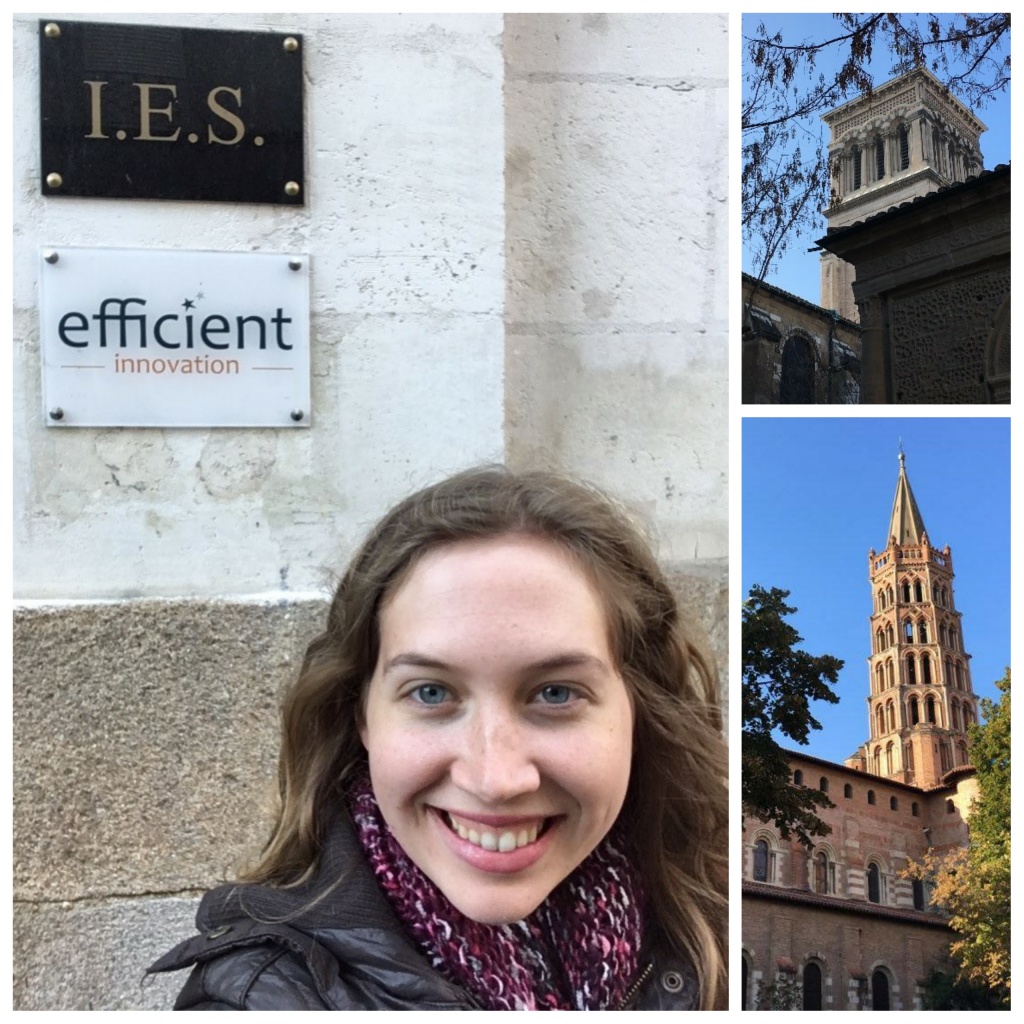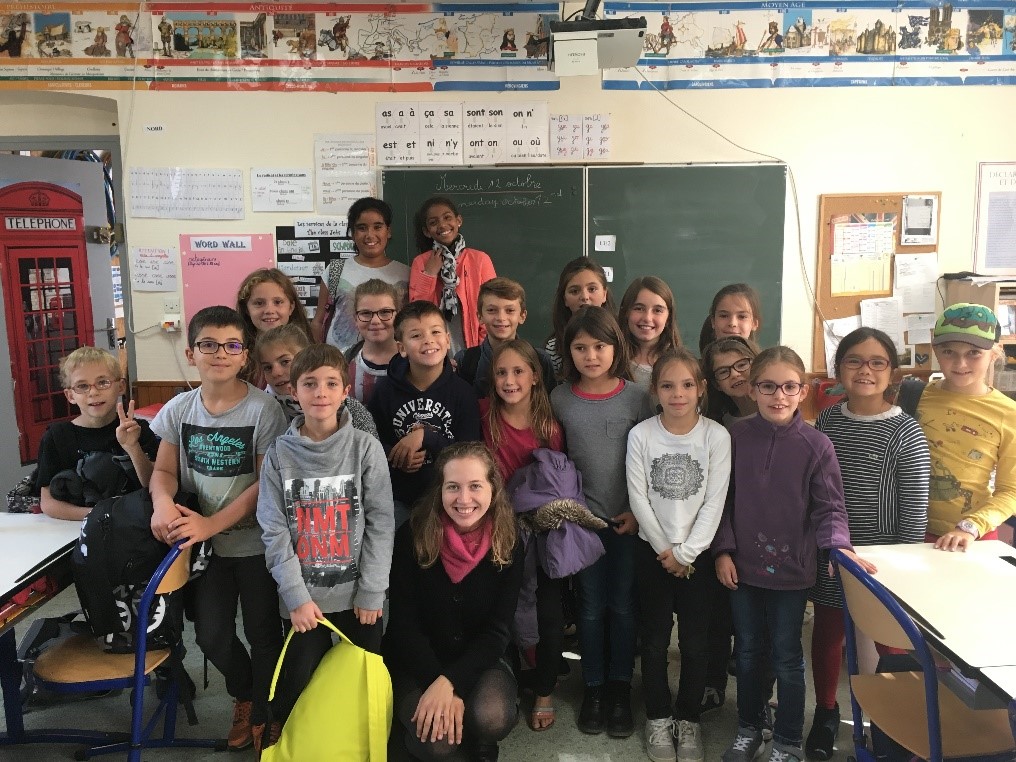 After spending junior year studying abroad, Ashley Malin ’16 (Religion major, French minor) set her sights on returning to France after graduation from Puget Sound. She applied and was ultimately accepted into the Teaching Assistant Program in France (TAPIF).
After spending junior year studying abroad, Ashley Malin ’16 (Religion major, French minor) set her sights on returning to France after graduation from Puget Sound. She applied and was ultimately accepted into the Teaching Assistant Program in France (TAPIF).
As her year with TAPIF draws to a close, Ashley reflects on how the experience has impacted her career path.
CES: What’s it been like, working as an English Teaching Assistant in the TAPIF program?
Ashley: I work in three different French primary schools outside of Valence, where I live in SE France. I get up very early to commute to work by bus on Mondays and Thursdays and by train on Wednesdays. I work with three to six classes during those three days and really get to know my French colleagues.
Both the challenge and the reward has been working with a variety of people at different language learning levels. These schools are in smaller towns and are very much in need of native English speakers.
I am passionate about teaching my students ages five to twelve in only the target language, English. My goal is to give them a bit of English immersion with plenty of images, gestures, songs, and movement. I wouldn’t feel nearly as prepared to teach entirely in English without the TEFL (Teaching English as a Foreign Language) course I took in Toulouse for the entire month of September before the start of TAPIF in October.
The TAPIF program allows me to legally work in France for an academic school year (October-April) while exploring and improving my teaching skills. Assistants can also be placed in middle and high schools throughout the country, but I’m glad I initially was wait-listed and then placed at the primary school level. It takes a lot of patience and repetition to teach English at that young of a level, but I think it’s the perfect age. They are language sponges and absorb so much!
CES: How does this experience compare to studying internationally with IES Abroad?
Ashley: Living between two worlds—France and the USA—was very challenging, but also incredibly rewarding. It was difficult transitioning back to Puget Sound after a full year studying abroad. However, I was able to integrate my French language skills into my academic, theoretical studies in religion; and having visited the impressive Jewish Museum in Berlin, I was inspired to take that interest further by studying Jewish religious ethics my senior year.
After studying for my full junior year in Nantes, I sense that my French has significantly improved during this second year. It’s less academic French and more expressions and slang. But,
…working abroad couldn’t be a more different experience, compared to studying abroad.
IES Abroad provided a safe bubble, where I was surrounded by other American students. This time, I have less help finding housing or a host family, or finding work on the side like private English teaching. I’ve had to do more things on own, which continue to be a challenge while living in a foreign country: house searching, opening a bank account, commuting to my three schools, visa or other bureaucratic paperwork, and budgeting.
I feel I have more of a diverse, close community in Valence than I did while studying abroad in Nantes. A few of my friends are fellow American assistants, but there have been more opportunities to make friends and meet with many other international expats who are working in the Valence area outside of the TAPIF assistant bubble. My community continues to grow in France, for which I am grateful.
CES: How has this experience influenced your career goals?
Ashley: It’s confirmed how much I enjoy foreign language teaching, whether it be teaching English as a foreign language or teaching French. It’s especially rewarding to teach students at a young age and expose them to hearing another foreign language, rather than simply writing it. I enjoy how much creative freedom I have to create mini lesson plans, and find different ways of communicating what I want my students to retain with simple and sometimes minimal English words or phrases: less is more.
TAPIF has also fostered my passion and curiosity for pursuing opportunities in International Education and Management, fostering intercultural and educational interactions with foreign exchange students, and assisting students through the study abroad process.
Teaching foreign languages and international education are two avenues that are closely aligned for me. However, I also miss my academic studies in religion and how much I felt at home in Puget Sound’s Religious Studies Department. I’m considering ways to further pursue my studies in religion, and how intercultural communication can continue to be a part of my career.
CES: What advice do you have for Logger students?
Ashley: I encourage fellow Loggers to pursue their studies abroad and to connect with Puget Sound’s international students through International Programs‘ I-Connect Mentor program. I had the privilege senior year of getting to know Puget Sound’s 2015-2016 Fulbright Foreign Language (Malay Language and Culture) Teaching Assistant, Harjinder Kaur. Our intercultural exchanges and conversations were influential, leading me to choose Malaysia’s educational system—a topic I would never have considered before—for one of my senior research projects. I want to continue to encourage and grow from these exchanges in my future work.
Considering studying or working in France? Visit Ashley’s blog for additional insight into life in France.
© 2017 Career and Employment Services, University of Puget Sound
Photos provided by Ashley Malin
Save